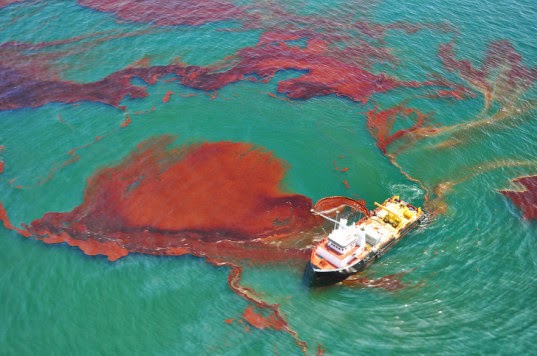'Missing Oil' from 2010 BP Spill Found on Gulf Seafloor
'Missing Oil' from 2010 BP Spill Found on Gulf Seafloor
WNO-Up to 10 million gallons (38 million liters) of raw petroleum from the 2010 Deepwater Horizon oil slick has settled at the base of the Gulf of Mexico, where it is undermining natural life and marine biological systems, as indicated by another study.
The discovering aides explain the puzzle of where the "missing" oil from the spill arrived. Its area had evaded both the U.s. government and BP cleanup groups after the April 2010 debacle that brought on around 200 million gallons (757 million liters) of unrefined petroleum to break into the Gulf.
"This is going to influence the Gulf for a considerable length of time to come," Jeff Chanton, the study's lead specialist and a teacher of compound oceanography at Florida State University, said in an announcement. "Fish will probably ingest contaminants in light of the fact that worms ingest the dregs, and fish consume the worms. It's a conductor for defilement into the sustenance web." [deepwater Horizon: Images of an Impact]
The analysts took 62 dregs centers from a zone incorporating 9,266 square miles (24,000 square kilometers) around the site of the Deepwater Horizon spill. Dissimilar to other dregs on the sea floor, oil does not contain any carbon-14, a radioactive isotope. Hence, dregs tests without carbon-14 show that oil is available, Chanton said.
The researchers evaded ranges with regular oil leaks, offers in which oil gradually spills onto the sea floor through a progression of splits. In these zones, the residue centers would have an absence of carbon-14 all through the specimen. In zones that don't regularly have oil, "the oil is just in the surficial layer, as in that 0 to 1 centimeter [0 to 0.39 inches]" interim," Chanton told Live Science.
In the wake of contemplating the examples, the specialists made a guide of the regions influenced by the spill. Around 3,243 square miles (8,400 square km) are secured with oil from the Deepwater Horizon spill, they found.
It's indistinct precisely how the oil got there after the spill. One thought is that the oil particles amassed together at the water's surface, or in tufts from the submerged hole, and got to be sufficiently substantial to sink to the base of the Gulf. Cleanup teams additionally blazed extensive patches of oil, and the ensuing dark carbon and fiery remains could have sunk into the water, the analysts said. Alternately, zooplankton (little creatures that float close to the water's surface) may have ingested the oil and disposed of it in fecal pellets that sank to the Gulf floor, the specialists included.
For the time being, the indented oil may help keep the water above it clear and free of dark oil particles, Chanton said, yet its transforming into a long haul issue.
"There's less oxygen down there, along these lines that will moderate the decay rate of the oil," Chanton said. "It may be there for a drawn out stretch of time, a little supply of sullying." Moreover, the oil may cause tumors and injuries on submerged creatures, exploration recommends.
The new study underpins the discoveries of an alternate autonomous study, which found that around 10 percent of the spill's oil made it to the Gulf floor. Utilizing hopane, a hydrocarbon found in oil, the scientists of that study, distributed in the diary Proceedings of the National Academy of Sciences in October 2014, investigated residue examples to perceive the amount of oil had tumbled to the base of the Gulf.
The new study ascertains that 3 to 5 percent of the oil from the spill sank to the sea floor, yet the consequences of the two studies aren't that diverse, Chanton said.
"Our number is a tiny bit more moderate than theirs," he said, however "in the event that the two methodologies concur inside a variable of two, that is really useful for assessing the majority of the oil on the ocean bottom."





.jpg)
Comments
Post a Comment